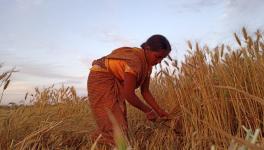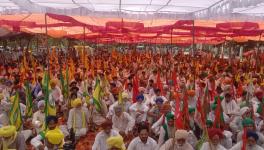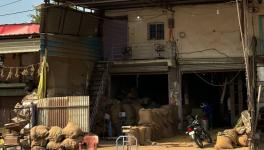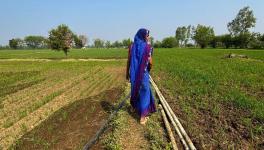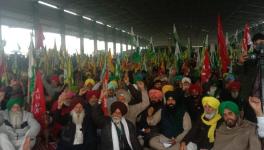UP: Paltry Payments Burden Sugarcane Farmers in Lakhimpur Kheri
Devinder Singh breathed a sigh of relief after persistent phone calls to pay the debt accumulated by him ceased temporarily. Singh, a Sugarcane farmer in Uttar Pradesh’s Lakhimpur Kheri district, received a paltry payment for his produce sold in November 2020 from Bajaj Hindusthan Sugar Limited’s mill in Palia. He still expects that the rest payment of more than Rs 2 lakh would be made amid growing pressure of farmers during the election season. However, the delay of more than a year has cost farmers dearly with their lives and property.
Bajaj Hindusthan Sugar Limited, which operates 14 mills across the state, owes Rs 2,361 crores to farmers for the previous two crushing seasons. The company has been expressing its inability to pay the amount to farmers as it did not get its payment from the energy department for power supplied through its subsidiary from its Lalitpur plant. Sensing growing resentment among farmers in the election-bound state already facing the heat with another massacre conducted by Ashish Mishra, son of Union Minister of State for Home Affairs, Yogi government first issued recovery notices under UP Sugarcane (regulation of supply and purchase) Act 1953. It then approved the diversion of money worth Rs 1,000 crore for power bills to farmers in two equal instalments of Rs 500 crore each. The farmers got the paltry payment on Friday last week who maintain it is too little to douse the ever-increasing debt fire.
Singh emphasised that the farmers sold the sugarcane at the loss of Rs 100-115 per quintal to mitigate the stress of delayed payments. He said the farmers sold their sugarcane to jaggery making units at Rs 225 per quintal, whereas state advised price (SAP) remains Rs 325 per quintal. Second, their main focus remains on paying the debt than focusing on opportunities to prosper. “Our ancestors could build us homes, raise us happily and buy some land only because they could get fair and remunerative prices for crops. The Palia mill alone owes Rs 125 crore and Rs 112 crore to farmers for crushing seasons 2020-21 and Rs 2021-22, respectively,” he added.
Talking to NewsClick over the phone, Singh said that the biggest worry for his family remains the ever-growing debt burden with no opportunity insight to settle it. He said, “nobody feels this pain. How about paying a person’s salary after one year, and the vicious cycle does not seem to end. The government may free itself of its responsibility by saying that it has revised the credit limit for farmers. Please understand that it’s credit, for God’s sake, and it needs to be paid. I took a loan for my sister’s marriage. We have two Kisan Credit Cards registered against my mother and me and have a cumulative loan of 11.5 Lakh. I do not think that it can be paid now with the current mode of payment where mills are depriving us of our own money.”
Singh went on to portray the disturbing picture in the district where farmers sell their land to property dealers for upcoming townships to settle their debt, but it is also turning them into daily wage labourers. He said,” being landless enables you to enrol for Public Distribution System (PDS) and daily wages help you in running livelihoods, but you have become labourer into your farms !”
Aman Sandhu, general secretary, BKU Chaduni who spearheaded the movement for payment alleged that the police and district administration slapped charges for violating the COVID-19 protocols for staging a sit-in in front of Bajaj Hindusthan Sugar Ltd Mill in Gola Gokarnnath Lakhimpur Kheri even when they maintained that the protest was deliberately conducted with only five protesters per day. The mill owed Rs 137 crore to over 67,000 farmers.
Listing out the difficulties faced by the farmers, he said that many farmers died in the previous second wave of the Coronavirus in absence of treatment because they had no money in hand. “We are getting daily reminders from the banks regarding our loans. The electricity department disconnected several connections because we have not paid our bills for months.”
He added that the small and marginal farmers grow sugarcane because it has comparatively higher returns and an easy process for procurement through private mills.
“For wheat and paddy growing farmers, the chances of procurement on Minimum Support Price (MSP) is very bleak because there are hardly any centres for such procurement. Compared to this, the sugarcane inputs cost about Rs 65,000 per acre, whereas the yield of 400 quintals per acre would fetch you Rs 1,30,000. This remuneration is missing from other crops. But delayed payments are making it harder for them to carry out agriculture.”
Showing the agreement reached between the Bajaj Hindusthan Sugar Limited and farmers after intervention from the Chief Development Officer, Sandhu said that the company did not abide by its own agreement. As per the agreement, the mill would make the payment within 14 days of procurement, and it would make full payment to the farmers with sugarcane with less than ten trolleys.
He said, “What did we commit wrong when we reminded it of its promises. The state government used its police to intimidate us. But we are not going anywhere.”
Get the latest reports & analysis with people's perspective on Protests, movements & deep analytical videos, discussions of the current affairs in your Telegram app. Subscribe to NewsClick's Telegram channel & get Real-Time updates on stories, as they get published on our website.














